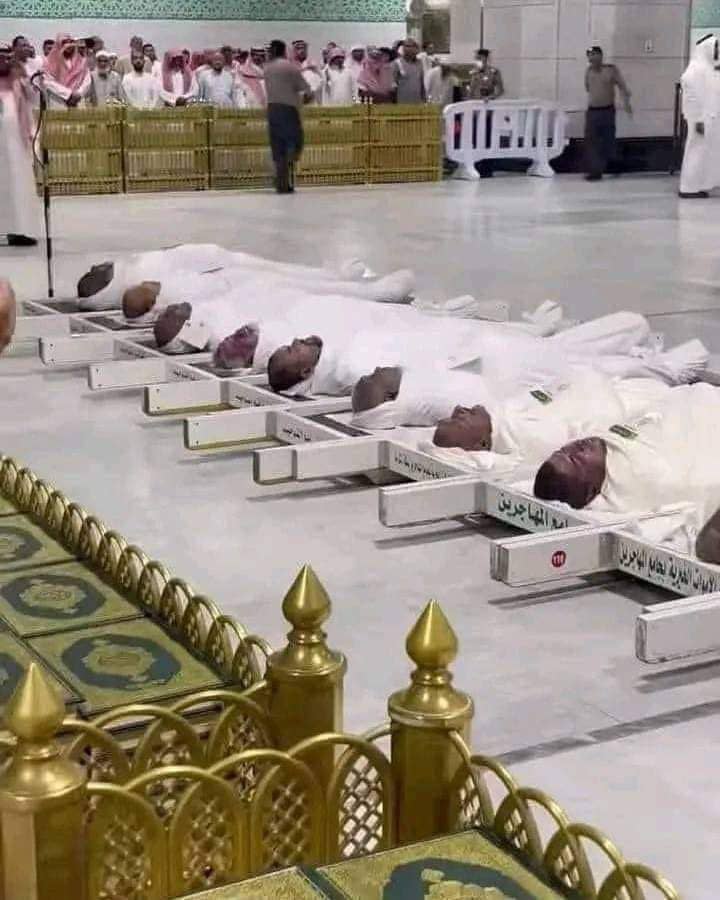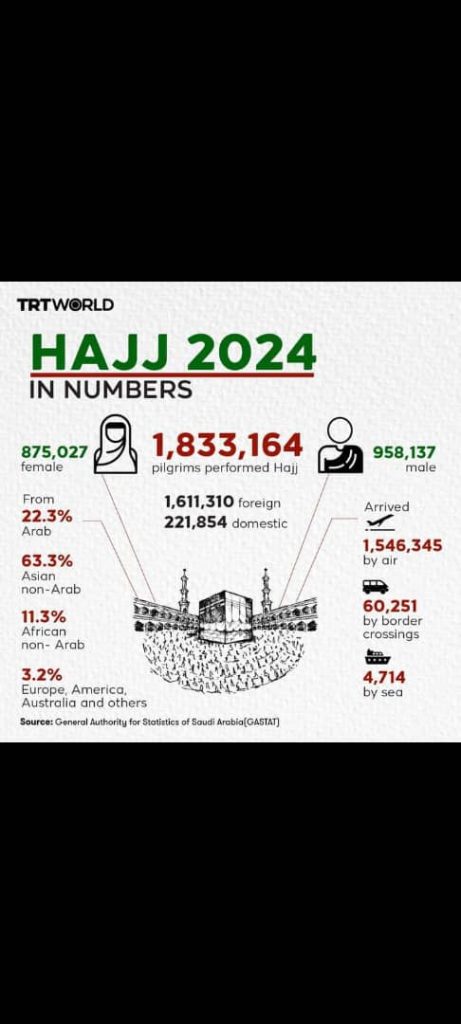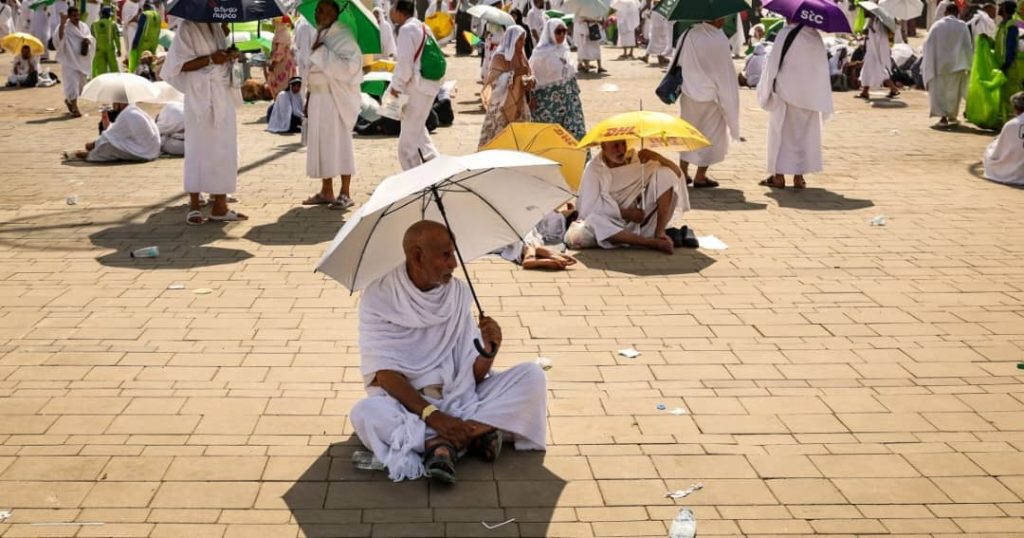Pilgrims from far and wide annually troop in their numbers to Saudi Arabia to visit the holy city of Mecca on pilgrimage. The event is marked by Muslims who wish to perform hajj, one of the pillars of Islam. The religious obligation takes 5 to 6 days to complete as it involves prayers, traveling, animal sacrifice, stone throwing, hair shaving and walking a long distance.
The extensive events and sanctified actions of Hajj requires efficient service delivery and proper management for the smooth running of the event. But pilgrims from Nigeria have complained about the poor services and treatment which they received in Saudi Arabia this year. This is despite the huge amount that was paid to cover the duration of the pilgrimage.
The complaints began when Nigerians took to social media to lament on the quality of food being served to them. A Facebook user, Babagana Digima took to his page to complain about the 3 pieces of bean cake and pap that was served to him.
He said: “After paying N8 million for Hajj, see the breakfast that our pilgrims are being given! NAHCON Nigeria Fatima Mustapha. This what was given today 28th May 2024. In fact some pilgrims have already started begging to get money to buy food because even their remaining $300 that was promised to be paid to them in Saudi (out of $500) is not forthcoming from the authorities!”
The pilgrims also faced issues of accommodation insufficiency. In a video that went viral, a pilgrim identified as Usman Bello Daura complained about the poor housing condition. Some pilgrims were lying on the floor, and some didn’t have space to lay down as the tent was filled with pilgrims.
In the video, Usman said: “Here are my colleague and this is our condition. This is where we are sleeping. We are facing very critical situation of accommodation and I am afraid because of a day like tomorrow (the day of Arafat) because this is the day everyone needs to do well as it is the most significant day of Hajj.”
“We don’t want this kind of thing to happen tomorrow, which is the day of Arafat, because our leader didn’t do justice to us in terms of our welfare and accommodations.
According to another pilgrim in the video, the situation was peculiar to those from Katsina state as Pilgrims from Borno were well catered to. He said:
“I have seen the difference between pilgrims from Maiduguri and Katsina state because Maiduguri is where my father comes through, and his accommodation and any other things are intact. But here the pilgrims from Katsina are abandoned and I try to find our representatives here in Saudi Arabia to complain to, but I couldn’t find any of them.”
He continued: “Today they brought us to Mina and the authorities from Katsina state have been going up and down with us without providing us with proper places of accommodation.
“Please and I am pleading whosoever is responsible for our welfare in this holy land should please come out to hear us out.”
The governor of Niger state, Umar Bago also complained about NAHCON in dispensing its duties. In an interview with journalists in Mecca, he said he would lead the committee to scrap NAHCON as they were not helping matters. He said:
“As a state governor, I want to lead a committee of the governors and the NGF to scrap NAHCON. NAHCON is not helping matters.
“The Federal Government is too big to be worried about Hajj problems. This is a local government issue, not a state one. State governments should be able to organise pilgrimages and engage agents from the private sector who can manage this more effectively, as other countries do. The government has no business in doing this,” he said.
According to the governor, some of the VIPs were appalled by the lack of sufficient tents.
“Can you imagine governors of Nigeria, the Speaker of the Federal Republic of Nigeria, paying to NAHCON and having no place to sleep and being embarrassed? People will say it is because governors have been affected. Yes, they have been affected, but it is good that we are affected, and this is the time for us to change the narrative,” he said in the video.
Remember that the Federal Government had subsidized the 2024 Hajj with N90 billion following the devaluation of the naira. It is sad that despite the enormous funds available to NAHCON through government subsidies and personal payments, stories of mistreatment permeated.
Moreover, Human Rights watch reports that over 1300 Muslim pilgrims have died during the hajj due to extreme heat conditions. Temperatures soared over 50 degrees Celsius and has led to the death of many pilgrims. This alarming number of death due to the weather condition has incited most countries including human rights watch that tweeted: “Saudi authorities have an obligation to protect people’s health from known hazards like extreme heat.”

Countries like Tunisia took measures against the Minister for religious Affairs who was sacked after he came under criticism for the deaths of Tunisian pilgrims in Mecca. The Minister, Ibrahim Chaibi said the pilgrims that died travelled to Saudi Arabia via tourist visa and not through the official Saudi hajj programme.
The pilgrims that died in Saudi Arabia as reported by CNN include 14 Malaysians, 165 Indonesians, 75 Jordanians, 35 Pakistanis, 49 Tunisians, 11 Iranians and 98 Indians, quoting authorities in each country.
Looking at the Hajj 2024 in numbers, about 1,833,164 pilgrims performed Hajj, 875,027 being female and 958,137 were male. 1,611,310 were foreign pilgrims and 221,854 were domestic pilgrims.

Saudi Arabia can take several measures to prevent pilgrims from suffering during heat waves:
- Advanced Weather Monitoring: Implement advanced weather monitoring systems to accurately predict heat waves and extreme weather events well in advance.
- Early Warning Systems: Establish robust early warning systems to alert pilgrims, organizers, and authorities about impending heat waves.
- Public Awareness Campaigns: Conduct extensive public awareness campaigns among pilgrims about the risks of heat waves and how to stay safe.
- Shaded Areas: Increase the availability of shaded areas along pilgrimage routes, especially near holy sites like Mecca and Medina, where pilgrims gather in large numbers.
- Cooling Stations: Set up cooling stations equipped with fans, misting systems, and chilled drinking water along pilgrimage routes and in crowded areas.
- Health Support: Ensure there are sufficient medical and health support facilities available to provide immediate care to pilgrims affected by heat-related illnesses.
- Schedule Adjustments: Consider adjusting the timing or scheduling of pilgrimages to avoid the hottest parts of the day with extreme heat.
- Infrastructure Improvements: Invest in infrastructure improvements such as better ventilation in tents and accommodations, as well as improved transportation systems to reduce heat exposure during travel.
- Emergency Preparedness: Develop comprehensive emergency response plans specifically tailored for heat waves, including rapid deployment of resources and personnel.
- International Collaboration: Collaborate with international organizations and experts to exchange knowledge and best practices in managing heat waves and protecting vulnerable populations.

The number of pilgrims may have become too high for the Saudi Authorities to handle, coupled with the fact that some pilgrims used the tourist visa to perform hajj instead of going through the Saudi official Hajj programme. It is the duty of the Saudi authorities and the various countries to ensure the safety and health of the citizens who visit. Due to the hot and desert climate of Saudi Arabia, one would expect that both authorities would put efforts in place to ensure the safety of their pilgrims. Even though Muslims see death in Mecca as a befitting end, dying from heatstroke is not a pleasant one.
